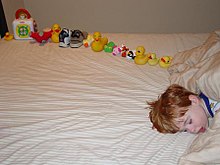 The National Autism Association responded firmly in regards to Bruesewitz v. Wyeth, in which the parents of Hannah Bruesewitz sued the Pfizer company, saying that its DTP vaccine caused her seizure disorder in 1992, and that the company knew it could produce a safer shot but chose not to. The Bruesewitzes took their claims to vaccine court first, but were denied, so they sued. They also recently lost this case in the Supreme Court.
The National Autism Association responded firmly in regards to Bruesewitz v. Wyeth, in which the parents of Hannah Bruesewitz sued the Pfizer company, saying that its DTP vaccine caused her seizure disorder in 1992, and that the company knew it could produce a safer shot but chose not to. The Bruesewitzes took their claims to vaccine court first, but were denied, so they sued. They also recently lost this case in the Supreme Court.
National Autism Association (NAA) board chair Lori McIlwain stated: "This ruling is a crushing blow not only to families struggling to provide care for their vaccine-injured children, but also to the rights of every US citizen. No other industry enjoys such complete protection from liability for harm caused to people injured by their products."
The 1986 law, designed to make sure vaccine makers didn't abandon the market, set up a compensation system for any vaccine related injuries precisely to protect companies from court claims.
The NAA feels the Bruesewitz outcome removes any remaining incentive for vaccine manufacturers to make their product as safe as possible. The Bruesewitz family sought compensation for their daughter Hannah who developed a lifelong seizure disorder following a DTP vaccine she received as an infant in 1992.
DTP vaccine confers immunity to diphtheria, tetanus, and pertussis. The vaccine used in the United States is actually multiple diphtheria and tetanus toxoids combined with acellular pertussis (DTaP). The original vaccine, which as of 2004 was still used in other parts of the world, contains whole cells of Bordatella pertussis, the organism that causes pertussis, better known as whooping cough . The whole cell vaccine is more likely to cause adverse effects and does not provide any greater immunity.
More...





 The US supreme court on Monday heard arguments in a case that could threaten Americans’ access...
The US supreme court on Monday heard arguments in a case that could threaten Americans’ access... Toothpaste can be widely contaminated with lead and other dangerous heavy metals, new research shows.
Most of...
Toothpaste can be widely contaminated with lead and other dangerous heavy metals, new research shows.
Most of...






























